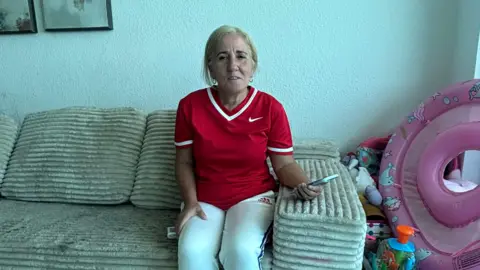When her son was taken into immigration custody, Yaneisy Fernandez feared the worst. Then she got a call from him inside Alligator Alcatraz.
We had no idea where he was until he called us, Yaneisy told the BBC. He said, 'mom, they took me to the facility of the crocodiles.' That's how he put it.
The temporary immigration detention centre built in Florida's Everglades has quickly become a polarising symbol of President Donald Trump's immigration policy.
Now, just two months after it opened, the Department of Homeland Security (DHS) has said it will be shutting it down, in compliance with a judge's orders. The process is already under way - border tsar Tom Homan told the BBC during a press conference that only about 50% of the detainees remain.
The BBC spoke to the families of two inmates who were moved in the past month, who say that their loved ones disappeared into the system when they were at their most vulnerable.
That includes Yaneisy's son Michael Borrego Fernandez, who says he was left bleeding while in serious pain after a medical incident, before being moved to another facility. He is part of an ongoing lawsuit alleging inmates were denied in-person access to their lawyers.
Built over eight days at the end of June in the Everglades, a protected wetlands famous for its alligators, the South Florida Detention Facility quickly became one of the most notorious immigration detention centres in the US.
Dubbed Alligator Alcatraz, the facility was built to house about 3,000 people but was never at capacity, even as the number of individuals being held in immigration detention across the US reached a record-high of 59,000 as of mid-August.
While it was open, it was a lightning rod for America's debate over Trump's crackdown on illegal immigration. Some came to visit the centre to protest, while others stopped by to take proud selfies with the Alligator Alcatraz sign outside.
When the facility first opened, the Florida Republican Party commissioned Alligator Alcatraz merchandise: t-shirts, caps and beer coolers.
People are fired up about the idea that we are finally closing the border and sending people who are here illegally who are committing crimes out of the country, said Florida GOP chair, Evan Power.
There have been conflicting reports about conditions inside. After a visit by lawmakers in July, Republicans said it was a well-run, safe and clean facility. Democrats, however, described the conditions as vile, crowded and unsanitary.
Now, a judge has ordered a preliminary injunction to shut it down within 60 days, while they hear a case claiming the government did not follow protocol when it built the facility. Although the government is appealing against that decision, the DHS said it will obey the judge's order.
Michael Fernandez moved to the US from Cuba in 2019 and was granted temporary political asylum, his mother said. After he got caught up in a hot-tub construction scheme in 2021, he pleaded guilty to grand theft, unaware of the company's illegal activities. In January, he was pulled over while driving his niece to school and ended up in ICE custody.
Michael had been in Alligator Alcatraz less than a week when Yaneisy received a call from some of the men detained alongside him. They told me that Michael woke up covered in blood, she said. Michael had developed stage 4 haemorrhoids and underwent colon surgery.
His health situation deteriorated further, as he faced inadequate medical attention and unsanitary conditions, leading Yaneisy to express her distress. This is not hygienic. They left him there like a dog, like someone who's been thrown away, she said.
Similarly, another detainee's family, Gladys, described her ordeal as her husband disappeared for over a week while in custody. Marco Alvarez Bravo was arrested despite ongoing asylum claims. Gladys expressed her worries about her husband's health condition during this time, as he experiences a serious heart condition and pneumonia.
The court's decision to close the facility marks a significant moment in the ongoing debate over immigration enforcement in the U.S., while new facilities are being planned across the nation.



















